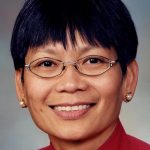How to gain political power
How to gain political power

Velma Veloria, former Washington State Legislator and social justice advocate.
(Photo from her Wikipedia)
B.C. Fil-Cans seek advice from Washington Legislator
By Michelle Chermaine Ramos
The Philippine Reporter
What will it take for Filipino-Canadians to rise as leaders in the political sphere as some Filipino-Americans have done?
Despite being the third largest ethnic group in Canada, like many growing Filipino communities across Canada, the B.C. Fil-Can community is frustrated with their lack of representation in politics.
Last year, they submitted a petition to Premier John Horgan endorsing MLA (Member of Legislative Assembly) Mable Elmore for his cabinet. Elmore became the first and only Filipino MLA in B.C. in 2009 and is currently serving her fourth term. With more than 70 percent of Filipinos voting for the NDP in B.C., many have expressed their disappointment for feeling ignored when Elmore was not appointed a cabinet seat.
They sought advice from former Washington State Legislator and social justice advocate Velma Veloria in a Zoom meeting on January 24, 2021. Veloria is the first Asian-American woman ever elected to the Washington State Legislature and the first Filipina to be elected to the American state legislature. She used her position to push for racial justice, workers’ rights, affordable housing, and introduced the legislation that made human trafficking a crime on the state level.
Now all 50 states have human trafficking bills, but Washington was the first due to Veloria’s efforts. She has also advocated for affordable senior housing leading to the 36-million-dollar construction of a 94-unit “Filipino village” funded by governing bodies in the city, county and state, with close to a million dollars also donated by Filipinos.
Strategizing a movement
“We would not have been able to get funding if we did not build coalitions with racial and social justice movements and other non-profit organizations that worked on racial, ethnic and cultural issues. We also could not have made it if we did not build relationships with our policy makers,” Veloria said. She emphasized the importance of training in leadership, public speaking and learning how to fundraise and strategize campaigns. Creating and revitalizing relationships with all supporters is key. You and how you personally respond to the challenges and opportunities that are presented to you are the most critical part of this movement.
This can involve talking to your legislators, volunteering and taking leadership positions in your workplace, union or other organizations while keeping up with global affairs and connecting with the Philippine diaspora.

Mable Elmore, B.C. Member of Legislative Assembly, serving her fourth term.
(Photo from her Twitter account)
Molding the next generation
First generation immigrants are often too busy working to survive which means the transfer of power, if any, would likely depend on the second generation. Veloria recommends one-on-one mentoring and involving the youth in community centres, universities and organizations. “The main thing is the credibility of your work in the community. If you’re active in your community and your community is active with elected officials then they tend to notice,” she explained.
B.C. Filipinos are striving to get government funding to build a community centre and have the Tagalog language offered in the school curriculum for their children to celebrate their heritage. In attendance from Vancouver was Consul General Maria Andrelita S. Austria who previously served in the U.S. where more Filipinos have been around longer. She mentioned the need to agree on how to best communicate concerns. “I think the issue is when we have many things to say and we say it in different ways, the message somehow gets lost. It’s one thing to have a voice, but it’s another thing to know what we want and how to deliver this message,” she explained.
Recreating our collective identity
The community has been meeting virtually to create a safe place to ask questions and share stories to plan how we can shape our future. RJ Aquino expressed his frustration over how Filipino frontliners’ sacrifices are generally overlooked in the mainstream narrative. “That ties into the larger story of our role in this society, and that ties into the larger narrative of how much more we contribute and do behind the scenes that are not recognized as we need to be recognized,” Aquino said.
“By gathering and raising support, we elevate each other to new heights,” explained Rudy Antonio. “Tell your friends. Voice your thoughts. Write your words. As our movement gains momentum, it empowers others to speak the truth. We have a spark of fire in the heart of the Filipino community and there’s no putting it out.”
Comments (0)